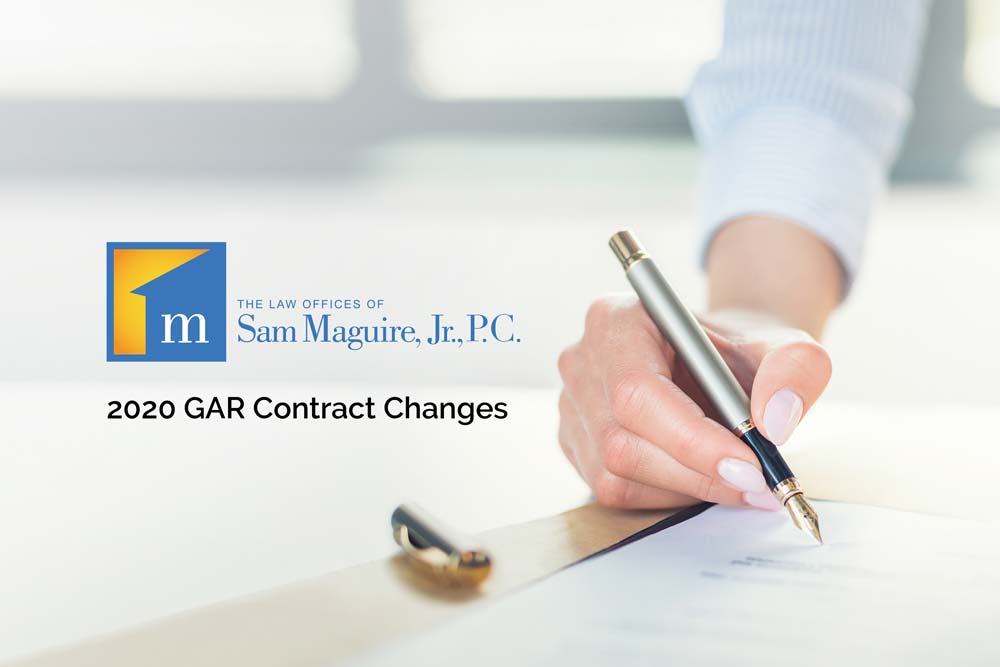What is the GAR Contract?
Every year the Georgia Association of Realtors makes revisions in the GAR Contract to keep pace with relevant legal actions and new laws. The GAR contract is a template-based contract designed to provide real estate agents, buyers, and sellers with certain predictable protections. To obtain the GAR forms you must be a GAR member or must have purchased a license to use them.
Changes to the GAR forms in 2020
There were many changes made throughout the GAR forms for 2020. Some were small changes like adding car charging stations and modifying “Pool” to “Above Ground Pool” in the Fixtures Checklist of the Seller’s Disclosure Form (GAR Form F301). Other changes were significant revisions and clarifications made to key contract forms in an effort to provide clear and concise protections for brokers and other real estate professionals. Provided below is an insight into what we have found to be some of the more interesting factors in the 2020 GAR Contract changes.
Revisions to the GAR Exclusive Seller Listing Agreement
Extending the Listing
Last year, the GAR added verbiage to the Exclusive Seller Listing Agreement (GAR form F101) that said when the listing period expires while the property is under contract, the listing period will automatically extend TO closing. Due to some confusion, that verbiage needed clarification. In the 2020 changes, the Exclusive Seller Listing Agreement now states that the listing period is extended THROUGH closing.
Limiting the Seller’s Ability to Market the Property
Additionally, some effort was put into limiting the ability of the seller to market the property without express written permission from the broker. Many sellers want their property sold as quickly as possible and go to great lengths to market the property everywhere they can. As this is often counterproductive, this new change should help strike a happy balance between broker and seller marketing efforts.
Revisions to Financing Contingency Exhibits
Conventional Loan Contingency
In recent years real estate professionals have noticed that some buyers would make conventional loan contingencies, but then switch to a VA, FHA or USDA loan. These types of government-insured loans tend to incur additional costs for the seller.
Due to this issue, the Conventional Financing Contingency form (GAR Form F404) now states that the buyer does not have the right to switch to a VA, FHA, or USDA loan unless all parties agree to the change.
That means the seller is not obligated to agree to this change and must provide their express permission for the switch to occur. Additionally, the contract must be amended to reflect the change.
VA Loan Contingency
In a mid-year change last June, the GAR altered the verbiage on the VA Financing Contingency exhibit (GAR Form F410) to reflect that the VA might require the seller to pay for certain costs that the VA borrower is prohibited from paying, specifically the termite clearance letter.
That verbiage has been further changed to say that the seller is obligated to obtain a termite clearance letter dated within 90days of closing, at the seller’s expense. If there is an active termite infestation, the seller is required to treat, or retreat, the property until a termite clearance letter can be obtained.
In the case of damage from a past infestation, the seller will be required to provide a cost estimate to the buyer. The buyer and seller are then able to negotiate who will incur these costs, however, if no agreement can be made within 3 days the contract is automatically terminated.
FHA Loan Contingency
Paragraph 15 of the FHA Loan Contingency exhibit (GAR Form F407) has been altered to match last year’s change to the Conventional Loan and VA Loan Contingency forms. This is interesting due to the fact that the GAR removed that same language from the Conventional Financing Contingency form this year, making it a new special stipulation.
This FHA Loan Contingency exhibit now states that when required repairs exceed the pre-agreed upon amount, the seller is required to provide a written, itemized list of repairs from a 3rd party contractor.
Either the seller or the buyer has the option to pay the excess amount, however, if no agreement can be made between the parties the agreement is automatically terminated after 3 days.
Georgia Association of Realtors 2020 Contract Changes
If you have any questions or comments regarding the 2020 GAR Contract form changes, it is suggested that you reach out to a trusted team of real estate law professionals like The Law Offices of Sam Maguire, Jr. P.C. For a full copy of the changes please reference the 2020 GAR Contract Changes Document.


